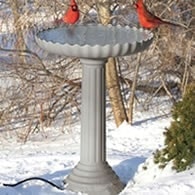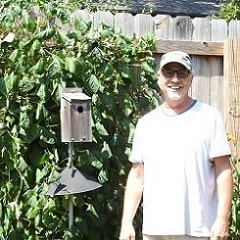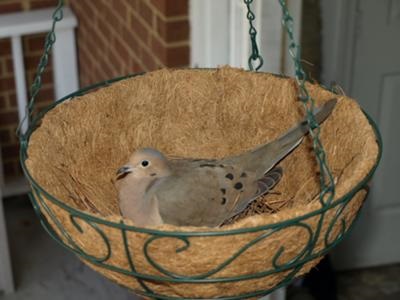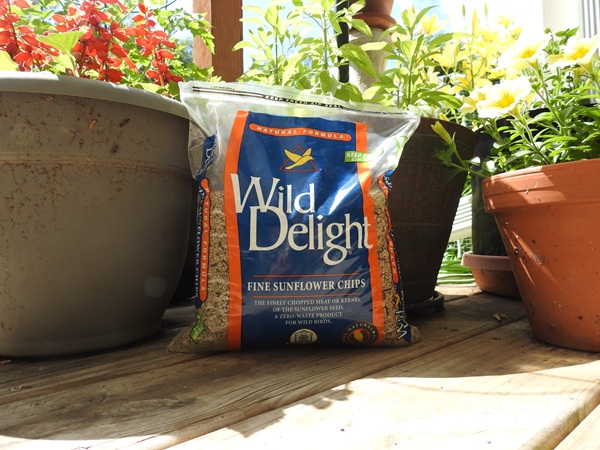Black-oil Sunflower Seeds: A Powerful Magnet for These Birds
Why Do Birds Like Black-oil Sunflower Seeds So Much?
Let's start with why more seed-eating birds like this type of seed over most other types.
Birds prefer black oil sunflower seeds for several reasons.

One of the main reasons is that these seeds are high in healthy fats and protein, which are essential nutrients for birds.
This high fat content provides birds with the energy they need to fly, hunt, and survive in their environment, while protein is necessary for muscle development and overall health.
Another reason birds prefer black-oil sunflower seeds is because they have thin shells, making it easier to crack open and access the nutritious kernel inside.
This is especially important for smaller birds, such as finches and chickadees, who may have difficulty opening larger seeds.
Black-oil sunflower seeds are also a favorite of many bird species because they have a rich, nutty flavor that birds are attracted to.
This flavor is due to the seeds' high oil content, which gives them a distinct taste that birds seem to like.
It's important to note that Black-oil Sunflower seed shouldn't be confused with the thick shell of the striped sunflower seeds.
You'll get fewer winter birds using the striped seed as it's more difficult to open.
Here's Why Bird Watchers Like Black-oil Sunflower Seed
One of the biggest advantages of black-oil sunflower seeds for birds is their versatility.
We can use them in a variety of feeders, including tube feeders, hopper feeders, and platform feeders.
This versatility makes them a popular choice for backyard birders who want to attract a wide variety of bird species to their feeders without purchasing multiple types of bird seed.
Another reason black-oil sunflower seed bird feeders are so popular is because they are relatively affordable.
They are widely available at most garden centers and farm supply stores and are often sold in bulk, which makes them a cost-effective choice for bird lovers who want to keep their feeders stocked year-round.
What Birds Love Black-oil Sunflower Seed?
You can attract several species of songbirds to your feeders using this type of sunflower seed.
Below we list 15 of the most common wild birds you'll see at your feeders during the winter months.

American Goldfinches: These small, brightly colored garden birds are known for their distinctive yellow plumage and are common visitors to bird feeders that contain black-oil sunflower seed.
They are particularly fond of sunflower hearts, which are the inner part of the seed. They are also attracted to Nyjer seed.

House Finches: Another common visitor to bird feeders, the house finch is a small, reddish-brown bird that is attracted to black-oil sunflower seed.

Northern Cardinal: One of the most recognizable birds in North America, the Cardinals are a striking bird with bright red plumage and crest.
I often attract them to my bird feeders that I fill with safflower seed, black-oil sunflower seed, and White Proso Millet.
They can handle the larger seeds due to their strong bills. They prefer to perch while eating so a platform feeder would be a good idea to accommodate them.

Blue Jay: These are larger birds known for their striking blue and white plumage.
They are attracted to black-oil sunflower seed and are particularly fond of peanuts, which can also be offered in a separate feeder.

Chickadees: These small birds are very active and are common visitors to bird feeders that contain black sunflower seeds.
They are known for their distinctive "chick-a-dee-dee-dee" call and are particularly fond of sunflower hearts.

Titmice: Similar in appearance to chickadees, these backyard birds are also attracted to black-oil seeds.
They are known for their distinctive crest and are often seen perched on feeders cracking open sunflower shells.
 White-breasted Nuthatch" (CC BY-SA 2.0) by DaPuglet
White-breasted Nuthatch" (CC BY-SA 2.0) by DaPugletNuthatches: These small, acrobatic birds are known for their ability to climb down trees headfirst.
Watch as they take a single seed from your backyard bird feeders before returning for another. They are particularly fond of sunflower hearts.

Mourning Dove: These gentle ground-feeding birds are common visitors to bird feeders.
To keep seed from spoiling from ground moisture, the use of tray feeders is recommended.
Doves are ground feeders and will often pick up spilled seed from the ground beneath the feeder. They do not crack open the seeds themselves.
Try using the shelled seeds or safflower seeds to attract them best.

Downy Woodpecker: These small, black and white birds are often seen clinging to tree trunks and branches.
They are attracted to black-oil sunflower seed and will often visit feeders that are located near trees.

Red-bellied Woodpecker: These medium-sized woodpeckers have striking red heads and are often seen at bird feeders that contain black-oil sunflower seed.
They are known to be particularly fond of peanuts and will often stash them in tree crevices to eat later.

Pine Siskins: These small, streaky birds are common visitors to bird feeders that contain black-oil sunflower seed.
They are often seen in flocks and can be identified by their distinctive call.

House Sparrow: These small, brown birds are common visitors to bird feeders and are attracted to black-oil sunflower seed.
They are known to be aggressive feeders and will often chase away other birds to get to the seed.
House sparrows are not native to North America and are considered an invasive species in some areas.
What Are the Disadvantages of Feeding Black-oil Sunflower Seeds?
Let's be honest, yes, black oil seeds offer the birds good nutrition while giving bird watchers an affordable way to have fun bird feeding but, they do have a couple of cons.
They have shells. These shells can accumulate on the ground and make a mess that requires regular cleaning.
If not taken care of, these shells will attract skunks, opossums, rats, and mice. The seeds that fall and are not eaten can sprout and grow the next year.
However, if you keep things clean around your feeders, I believe the advantage of having the widest variety of birds at your feeders far outweighs the disadvantages of this type of seed
So if you're looking to use only one type of bird seed, a bag or two of black-oil sunflower seeds is a good option. Soon, your backyard will become a haven for our feathered friends.
 Readers Digest Guide
Readers Digest Guide
|
 Golden Guide
Golden Guide
|
 Your State Only
Your State Only
|
 Nat-Geo Guide
Nat-Geo Guide
|






